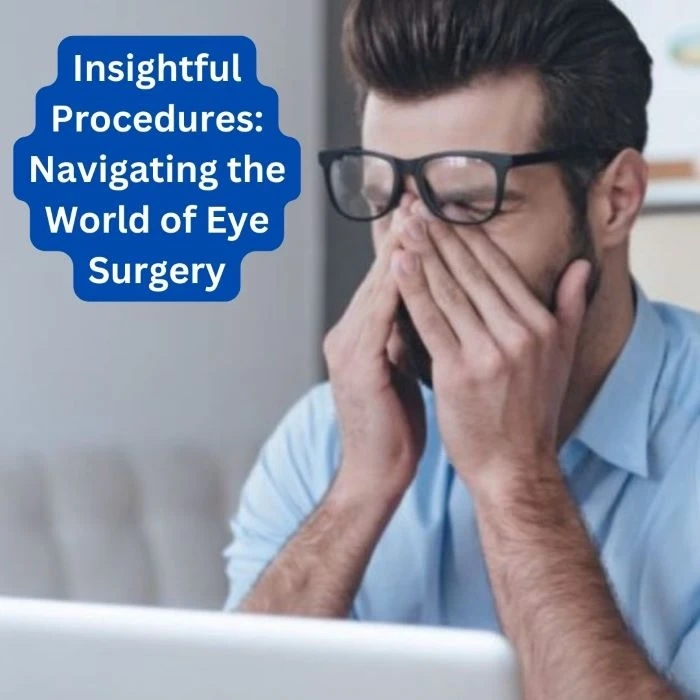Eye Surgery
Eye surgery, also known as ocular surgery or ophthalmic surgery, is a medical procedure performed on the eye or its adnexa (structures around the eye), typically by an ophthalmologist. These surgical interventions aim to correct or improve vision, treat eye diseases, or alleviate discomfort and impairments related to the eye.
What are the types of eye surgery?
Types of eye surgery:
LASIK (Laser-Assisted In Situ Keratomileusis)
LASIK, short for Laser-Assisted In Situ Keratomileusis, is one of the most well-known and widely performed eye surgeries globally. It is primarily used to correct common vision problems such as myopia (nearsightedness), hyperopia (farsightedness), and astigmatism.
PRK (Photorefractive Keratectomy)
PRK, or Photorefractive Keratectomy, is another laser-based eye surgery used to correct vision problems like myopia, hyperopia, and astigmatism.
Cataract Surgery
Cataract surgery is a procedure designed to treat cataracts, a common age-related condition that causes clouding of the eye\'s natural lens.
Glaucoma Surgery
Glaucoma surgery is performed to lower intraocular pressure in the eye, which is crucial in managing glaucoma, a condition that can lead to vision loss.
Corneal Transplant
Corneal transplant, also known as keratoplasty, is a surgical procedure that replaces a damaged or diseased cornea with a healthy donor cornea.
Who needs eye surgery?
Eye surgery can be a life-changing solution for individuals with various vision problems and eye conditions. One of the primary groups of people who may benefit from eye surgery is those who are nearsighted. Nearsightedness, or myopia, makes it challenging to see distant objects clearly. If you find yourself squinting or struggling to read road signs or the blackboard at school, you may be a candidate for eye surgery. Cataracts are a common age-related eye condition that causes the eye\'s natural lens to become cloudy, resulting in vision impairment. Individuals with cataracts often experience symptoms like blurred vision, glare from lights, and difficulty reading.
How long is eye surgery?
The duration of eye surgery can vary significantly depending on the type of procedure, its complexity, and the patient\'s specific needs. LASIK and PRK are two of the most commonly performed eye surgeries for vision correction. These procedures are known for their speed and efficiency. On average, LASIK and PRK each take approximately 15 to 30 minutes per eye. Cataract surgery is a slightly longer procedure compared to LASIK and PRK. The surgery typically takes about 30 to 45 minutes per eye. It is important to note that cataract surgery is often performed on one eye at a time, with a waiting period of a few weeks between surgeries. Glaucoma surgery can vary in duration depending on the specific procedure being performed. Some glaucoma surgeries, like trabeculectomy, can take around 30 to 45 minutes, while others, such as shunt procedures, may take slightly longer, averaging 45 to 60 minutes. Corneal transplant surgery, also known as keratoplasty, can take a bit longer compared to the procedures mentioned above. The surgery usually lasts approximately 60 to 90 minutes.
What is the best age to get eye surgery?
The decision to undergo eye surgery is a significant one, and the timing of the procedure is crucial. There isn\'t a one-size-fits-all answer when it comes to the best age for eye surgery, as it depends on various factors, including the type of surgery and the individual\'s unique circumstances. Young adults may benefit significantly from eye surgery as it can provide them with clearer vision and reduce their dependence on glasses or contact lenses. Cataract surgery is typically performed on older adults, typically those over the age of 50. Corneal transplant surgery may be required at any age, depending on the individual\'s specific condition.
Conclusion
In conclusion, eye surgery is a life-changing solution for those struggling with common vision problems. Whether you\'re nearsighted, farsighted, or have astigmatism, there\'s an eye surgery option that can provide you with clear, sharp vision. Consult with an ophthalmologist, understand the procedure, and experience the benefits of eye surgery for an improved quality of life and enhanced self-confidence. Don\'t let poor vision hold you back from seeing the world clearly. Say goodbye to glasses and contacts – it\'s time to embrace the future of better vision through eye surgery.




